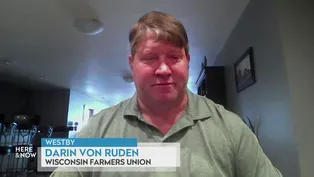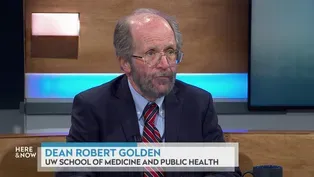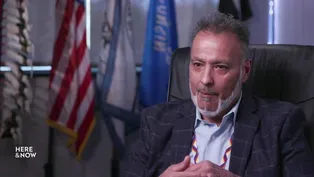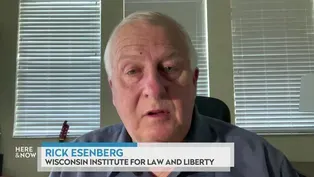Here and Now
Susan Crawford on the 2025 Wisconsin Supreme Court Race
Clip: Season 2300 Episode 2331 | 8m 5sVideo has Closed Captions
Susan Crawford on the Wisconsin Supreme Court and her perspectives on law and politics.
Dane County Circuit Judge Susan Crawford, a former assistant state attorney general and liberal running for an open seat on the Wisconsin Supreme Court, discusses her perspectives on law and politics.
Problems with Closed Captions? Closed Captioning Feedback
Problems with Closed Captions? Closed Captioning Feedback
Here and Now is a local public television program presented by PBS Wisconsin
Here and Now
Susan Crawford on the 2025 Wisconsin Supreme Court Race
Clip: Season 2300 Episode 2331 | 8m 5sVideo has Closed Captions
Dane County Circuit Judge Susan Crawford, a former assistant state attorney general and liberal running for an open seat on the Wisconsin Supreme Court, discusses her perspectives on law and politics.
Problems with Closed Captions? Closed Captioning Feedback
How to Watch Here and Now
Here and Now is available to stream on pbs.org and the free PBS App, available on iPhone, Apple TV, Android TV, Android smartphones, Amazon Fire TV, Amazon Fire Tablet, Roku, Samsung Smart TV, and Vizio.
Providing Support for PBS.org
Learn Moreabout PBS online sponsorship>> The race for a seat on the Wisconsin Supreme Court could break spending records.
And tonight we bring you an interview with Liberal candidate Susan Crawford.
Crawford is currently a Dane County Circuit court judge.
She previously worked for Democrat Jim Doyle, both when he was the attorney general and as his chief legal counsel when Doyle was governor.
Here and now, senior political reporter.
Zac Schultz sat down with Crawford in Madison.
>> Let's start with your judicial philosophy.
How would you define it, and what does it mean to you?
>> Yeah.
You know, I view myself as a really common sense judge.
So I focus on, first of all, making sure that I know what the facts are.
In any case.
I've listened to the evidence and just determine what the truth is.
I think that's a really important first step for any judge.
And then, of course, I make sure I get the law right after listening to the lawyers tell me what their positions are.
And then I have to make a decision after I have those two things established and I pay a lot of attention to how my decision is going to impact the people in a case.
The decisions I make are not abstract principles.
They are going to affect real people's lives.
So I do pay close attention to the context of my decisions.
And taking that up to the Wisconsin Supreme Court.
I will also consider how the decisions that I'm involved in as a justice will be applied in future cases, because at the Supreme Court level, those cases are precedent.
And you have to think ahead to other applications.
>> For the general public that doesn't have a lot of interaction with the legal system.
They've kind of developed the shorthand of judicial, conservative or judicial liberal.
And that's often we define the breakdown in the Supreme Court.
How would you define the distinction between those two categories if there is one?
of shorthand is actually not that useful.
What I do is just try to be fair and impartial in every case and apply the law to, you know, the facts that I've determined to be true in the way that does justice and protects the interests in the case, the people in the case, the way the law was intended.
>> There's been a lot of overturning of precedent recently, both at the national and at the state level.
>> Yes.
>> What are the factors that you would look at when you decide to overturn a case history?
>> Yeah, well, I have not been in a position to do that, of course, because I'm a currently a circuit court judge.
And on the circuit court, we are required to apply precedent.
I think that as a justice on the Wisconsin Supreme Court, what I would do, first of all, if asked to overturn precedent, is to consider what the attorney's arguments are in favor or against doing so.
You know, typically, justices are not coming to that conclusion on their own.
They're doing it because one of the parties in the case is asking them to overturn a prior precedent on grounds that it was wrongly decided.
So the first thing I would do in a particular case is determine how I think the law ought to be applied.
In that case, and often there's not a need to actually overturn a precedent, but rather to distinguish it, to say, well, there are some different facts in that case, and maybe it should be applied more narrowly or there's an exception that can be made in this new case.
So I think it's a rare instance where a precedent actually has to be overturned.
But, you know, I would do the same thing I just described.
I would look at the facts of the case, listen to the legal arguments on the Wisconsin Supreme Court.
I would certainly listen to what my fellow justices had to say and what their positions were before making an important decision like that to actually overturn a precedent.
>> In a couple of recent cases regarding redistricting, at least with the least change factor, and also drop boxes.
They overruled some recent precedent.
Does it make a difference how long the precedent has been there?
>> Well, I don't think it does necessarily.
I think it's a factor, but it is certainly not the only factor and probably not the most important one that I'd be looking at in making such a decision.
>> And then how do you contrast that to something like the Dobbs decision, which obviously precedent?
think the Dobbs case was wrongly decided, and it represents the first time, to my knowledge, that the United States Supreme Court has ever undone a long standing, constitutionally vested right recognized under our U.S. Constitution.
And I think that the case was poorly reasoned by the majority on the Supreme Court.
And that's very well laid out in the dissent to that case.
>> Brad Schimel partisan history as a candidate is well documented.
It's right next to his name on every election.
But you've worked in Democratic administrations, both in the attorney general and the governor's office and in private practice.
You have argued cases on behalf of issues that align with the Democratic Party.
And he argues that you are just as partisanly aligned.
How do you respond to that?
>> Well, I think he's wrong.
He I have never been involved in partisan politics, either as a candidate or with any involvement personally at either the county or state or national level in partisan politics.
That's Brad Schimmel's whole career.
And again, he, you know, he betrays his partisan roots by taking positions on every case that is pending just about in front of the Wisconsin Supreme Court, telling folks how he would decide them in a way, that is, you know, he's prejudging those cases.
That's very prejudicial to the parties in those cases, particularly when he, I believe, is making those decisions based on what he reads in the newspaper and not on the evidence in those cases or the legal arguments of the parties or any deliberations.
Obviously, with other justices on the Wisconsin Supreme Court.
So there's a very sharp contrast in how we are approaching this race.
I'm approaching it as a judge, and I want to be a good, fair, impartial, common sense justice for the people of Wisconsin.
Brad Schimel is approaching it as if it was a partisan race, and says he wants to get on the Supreme Court to help conservatives win elections.
>> In 2023.
Janet Protasiewicz talked about her values when she was running, and that brought a new attention and a new approac, as opposed to prior candidates in that race.
Do you think it was appropriate for her to talk about her values?
Are you wanting to talk about your values?
How does that reframe the public's expectation of a candidate for this office?
>> Yeah.
Well, I think first of all, that Janet Protasiewicz is a real asset to the Supreme Court.
I think she is doing a great job, and I think that she also handled herself well in her campaign.
You know, this is a different race.
And I, I want voters to get to know me and get to know who I am and what kind of justice they can expect me to be on the Wisconsin Supreme Court.
So there are appropriate ways for candidates for the Wisconsin Supreme Court or any court to talk about their experience, what they've worked for and their values.
And I will do that.
But I will stop short of taking a position on any case in or or likely to be in the Wisconsin Supreme Court.
I think that's improper.
And again, it's prejudging cases is prejudicial to the parties and unfortunately is what my opponent is doing.
Darin Von Ruden on Federal Funding Cuts to Wisconsin Farmers
Video has Closed Captions
Darin Von Ruden on moves to cut funds for food aid, agriculture and climate programs. (5m 23s)
Dr. Robert Golden on NIH Funding and Medical Research at UW
Video has Closed Captions
Robert Golden on impacts of shifting National Institute of Health rules on research funds. (5m 15s)
Here & Now opening for February 14, 2025
Video has Closed Captions
The introduction to the February 14, 2025 episode of Here & Now. (51s)
Ho-Chunk Nation Offers Free Tribal IDs Amid ICE Fears
Video has Closed Captions
Jon Greendeer on reimbursing U.S. passport costs for Ho-Chunk members amid fear over ICE. (1m 30s)
Rick Esenberg on Trump's Orders, Musk's Cuts and Rule of Law
Video has Closed Captions
Rick Esenberg on executive orders, Elon Musk and separation of powers in the Constitution. (4m 59s)
Providing Support for PBS.org
Learn Moreabout PBS online sponsorshipHere and Now is a local public television program presented by PBS Wisconsin
















